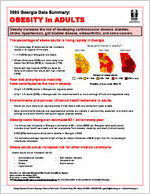2005 Georgia Data Summary:
OBESITY in ADULTS
Obesity increases the risk of developing cardiovascular disease, diabetes, stroke, hypertension, gall bladder disease, osteoarthritis, and some cancers.
The percentage of obese adults is rising rapidly in Georgia.
The percentage of obese adults has increased rapidly in all regions of the state.
1 in 4 (25%) adult Georgians are obese.
Geographic trends in obesity*
1993-1996
1997-1999
2000-2003
African Americans (32%) are more likely to be
obese than Whites (22%) or Hispanics (17%)
Adults with low incomes (37%) are twice as likely to be obese than adults with high incomes (18%).
Poor diet and physical inactivity have contributed to the rise in obesity.
< 10%
Percent of obese adults:
10 - 14%
15% - 19%
20 - 24%
*Definition of obese adults: BMI 30
25% or more
Only 2 in 5 (42%) adults in Georgia are regularly active.
Only 1 in 5 adults (23%) in Georgia eats the recommended 5 or more servings of fruits and vegetables daily.
Environments and policies influence health behaviors in adults.
Adults are more likely to be regularly active if they have a safe and convenient place to walk.
More environmental features and organizational policies are needed in communities, worksites, and health care settings to promote healthful eating and regular physical activity.
Obesity costs Georgia an estimated $2.1 billion every year.
The annual cost of obesity in Georgia is estimated at $2.1 billion ($250 per Georgian each year), which includes direct health care costs and lost productivity from disease, disability, and death (indirect costs).
5,200 (8%) deaths were attributed to obesity in Georgia in 2003.
The estimated average hospital length of stay for obese individuals is 85% longer than for normal-weight individuals nationwide.
Obese adults are at increased risk for other medical conditions.
Obese adults are at increased risk for:
- Cardiovascular disease
-
- Diabetes
-
- Stroke
-
- Hypertension
Gall bladder disease Osteoarthritis Some cancer
Data Source: Georgia Behavioral Risk Factor Surveillance System Date updated: December 2005 Publication number: DPH05.123H Visit http://www.health.state.ga.us/epi/cdiee/obesity.asp for more information on the prevalence of obesity in Georgia.
Georgia Department of Human Resources, Division of Public Health 2 Peachtree Street, NW Atlanta, GA 30303 (404) 657-3103 gdphinfo@dhr.state.ga.us http://health.state.ga.us
